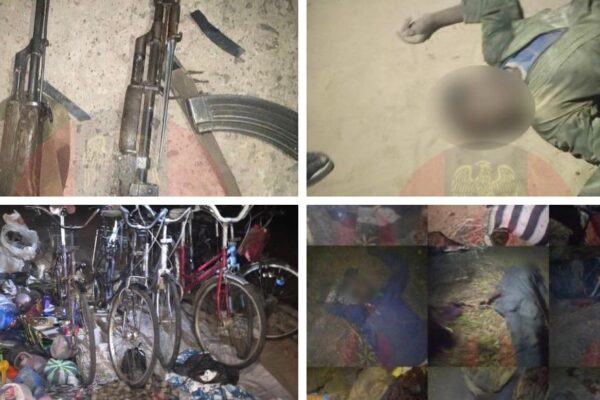Socio-Economic Rights and Accountability Project (SERAP) has filed a lawsuit against the Nigerian National Petroleum Company (NNPC) Limited over the “failure to account for the alleged missing or diverted N22.3 billion, USD$49.7 million, £14.3 million and €5.2 million oil money.” The suit followed the damning allegations documented in the 2022 audited report by the Auditor-General of the Federation, which was published on 9 September 2025. In the suit number FHC/ABJ/CS/195/2026 filed last Friday at the Federal High Court in Abuja, SERAP is seeking: “an order of mandamus to direct and compel the NNPCL to account for the alleged missing or diverted N22.3 billion, USD$49.7 million, £14.3 million, and €5.2 million oil money.” SERAP is asking the court to “direct and compel the NNPCL to disclose the specific financial transactions carried out in respect of the alleged missing or diverted N22.3 billion, USD$49.7 million, £14.3 million and €5.2 million oil money, including details of disbursement, the contractors, and other individuals who collected the money.” In the suit, SERAP is arguing that: “The diverted or misappropriated oil revenues reflect a failure of NNPCL accountability more generally and are directly linked to the institution’s continuing failure to uphold the principles of transparency and accountability.” SERAP is also arguing that, “granting the reliefs sought would strike a blow against the impunity of those responsible for the missing or diverted oil money, and ensure that the money is returned for the sake of NNPCL’s victims—Nigerians.” SERAP said, “The allegations have also undermined the economic development of the country, trapped the majority of Nigerians in poverty and deprived them of opportunities.” According to SERAP, “The Auditor-General has for many years documented reports of disappearance of oil money from the NNPCL. Nigerians continue to bear the brunt of these missing oil money meant to provide essential public services for Nigerians.” SERAP is also arguing that, “Combating the corruption epidemic in the oil sector would alleviate poverty, improve access of Nigerians to basic public goods and services, and enhance the ability of the government to meet its human rights and anti-corruption obligations.” The lawsuit filed on behalf of SERAP by its lawyers, Oluwakemi Agunbiade and Valentina Adegoke, read in part: “The diverted or misappropriated oil revenues have further damaged the already precarious economy and contributed to very high levels of deficit spending and borrowing by the government. “Despite the country’s enormous oil wealth, ordinary Nigerians have derived very little benefit from oil money primarily because of the widespread grand corruption including in the NNPCL, and the entrenched culture of impunity of perpetrators. “The grim allegations by the Auditor-General suggest a grave violation of the public trust and the provisions of the Nigerian Constitution, national anticorruption laws, and the country’s international human rights and anticorruption obligations. “According to the 2022 audited report by the Auditor General of the Federation, published on 9 September 2025, the Nigerian National Petroleum Corporation Limited (NNPCL) failed to account for over N22.3 billion, USD$49.7 million, £14.3 million and €5.2 million oil money. “The NNPCL in 2020 reportedly paid over N292 million [N292,609,972.29] ‘for a contract to construct an Accident and Emergency Facility along Airport Road, Abuja.’ But ‘the contractor has abandoned the contract, and failed to execute the job, despite collecting the fee.’ “The Auditor-General fears the contract money may have been ‘diverted’. He wants the money ‘recovered from the contractor and remitted to the treasury.’ “The NNPCL in 2021 also reportedly spent over GBP£14 million [£14,322,426.59] ‘to repair its London office.’ But ‘there was no evidence to show that the money was actually spent, and no documents of any spending’. “The NNPCL also ‘irregularly paid’ over USD$22 million [$22,842,938.28] to a contractor for lifting 9 cargoes of crude oil.’ The NNPCL ‘failed to explain why the amount due to it from crude from January to October 2019 was only $4,858,997.22 and why the contractor got over $22 million for crude for the same period.’ “The NNPCL in 2021 ‘irregularly paid N2.3 billion [N2,379,488,622.99] as car cash option to 100 staff’ but ‘without the approval of the National Salaries, Incomes and Wages Commission’, and ‘without any document to show that the 100 staff applied for the cash options and any rationale for the payments.’ “The NNPCL in 2021 also reportedly ‘failed to deduct statutory taxes of over N247 million [N247,181,597.92] from payments made to contractors and service providers.’ The NNPCL also ‘failed to deduct statutory taxes of over USD$529,000 [$529,863.24] from payments made to contractors and service providers.’ “The NNPCL ‘paid over N3bn [N3,445,022,107.40] for various services’ but ‘without any documents or trace’. The Auditor-General fears ‘the money may have diverted’. “The NNPCL ‘irregularly renewed a contract for over USD$1 million [$1,801,500.00] for charter hire of coastal vessel.’ The money was paid ‘before the consummation of a formal contract ratification.’ “The NNPCL also ‘irregularly paid a contractor over N355 million [N355,436,310.42] as consultancy fees for negotiating and securing waiver to avoid demurrage on abandoned cargoes.’ “The NNPCL ‘paid over N474 million [N474,462,744.53] to a contractor for the connection of Kaduna Refining and Petrochemical Company Limited to the National Grid.’ The Auditor-General is concerned ‘the money may have been lost’. “The NNPCL ‘paid over USD$2 million [$2,006,293.20] to a contractor for the rehabilitation and upgrade of system-depot project’, but ‘without any documents’. The NNPCL also ‘paid over N478 million [N478,505,300.00] to a contractor for the rehabilitation and upgrade of system-depot project’, but ‘without any documents’. “The NNPCL in 2019 ‘awarded a contract for over USD$8 million [$8, 211,432.00] ‘for the emergency procurement and installation of custody transfer meters on crude oil and product pipelines at eleven locations.’ The Auditor-General fears that ‘the payments may be for work not executed.’ “The NNPCL ‘irregularly paid over €5 million [€5,165,426.26] to a contractor for the operation and maintenance of Atlas Cove Jetty Facility’ but ‘without any documents.’ The Auditor-General fears that ‘the money may have been diverted’. “The NNPCL ‘paid over USD$1 million [$1,035,132.81] as legacy debt for charter hire of coastal vessels to a company without…









